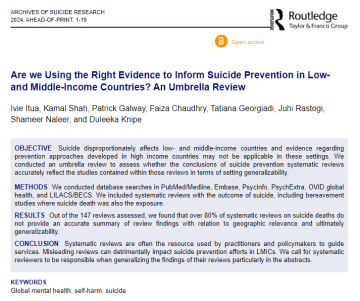Low- and middle-income countries aren't reflected in global suicide prevention evidence base
- 20 March 2024
Over 80 per cent of systematic reviews on suicide deaths do not provide an accurate summary of findings with relation to geographic relevance, according to research published in Archives of Suicide Research. This affects their generalisability, as findings from high-income countries are reported as if they are applicable to all.
Suicide disproportionately affects low- and middle-income countries. At the same time, few suicide research papers originate in these countries.
To assess whether the current evidence base informing suicide prevention globally summarised studies accurately, the research team analysed 147 systematic reviews. They found that the reviews generalised conclusions and abstracts to include the global population. They did this even though the studies included in the reviews did not reflect a global population and were instead mostly reflective of high-income countries.
In fact, less than 10 per cent of the studies included in the reviews were from low- and middle-income countries. The research team found that less than 1 in 5 of the systematic reviews they identified were led by researchers in middle-income countries and none were led by researchers in low-income countries.
Watch video abstract
Dr Duleeka Knipe, senior lecturer at Bristol Medical School, said:
“If research has been done in a particular setting, such as a high-income country, then that should be reflected in any conclusions drawn from it. Interventions researched in one setting and applied in another setting may not have the same effect.
“Countries which have similar characteristics and systems may share common themes in terms of suicide prevention. However, when these characteristics are vastly different, as is the case between many high- and low- and middle-income countries, researchers need to be cautious about how they present their results.
“Systematic reviews are key sources of information for policy makers. It is crucial that these reviews are representing the data within them correctly. Inadequate representation may lead to economically resource poor countries investing in prevention approaches which might be ineffective.”
